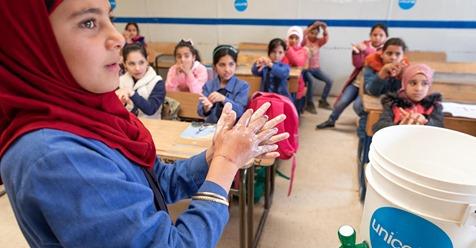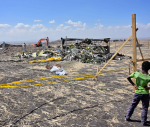You are here
UNICEF launches report on best hygiene practices
By Bahaa Al Deen Al Nawas - Jul 22,2020 - Last updated at Jul 22,2020
AMMAN — The UNICEF recently launched a report on the importance of following best practices in regards to water, sanitation and hygiene (WASH) as well as waste management in houses, schools, markets, prisons and health facilities to prevent the spread of the coronavirus.
The report, published recently and titled “Water, sanitation, hygiene and waste management for the COVID-19 virus”, says that providing safe water and proper sanitation and hygienic conditions protects people’s health during all infectious disease outbreaks, including COVID-19.
“The risk of transmission of the COVID-19 virus from the faeces of an infected person appears to be low,” according to the report, which adds that the virus may be exerted in faeces, regardless of diarrhoea or signs of intestinal infection.
The report advises following best practices for protecting the health of sanitation workers, noting that they should wear personal protective equipment, including protective outwear, heavy-duty gloves, boots, goggles, or a face shield and a mask.
It also advised them to avoid touching their eyes, nose, or mouth with unwashed hands, and follow physical distancing practices while working.
There are no studies on the survival of the coronavirus in drinking-water or sewage, the report says, explaining that the morphology and chemical structure of the novel virus are similar to other coronaviruses, “for which there are data about both survival in the environment and effective inactivation measures”.
"The water sector in Jordan has been able to provide water for all since the beginning of the coronavirus crisis, especially potable, clean and safe water that matches the highest international standards," Assistant Secretary General and Spokesperson at the Water Ministry Omar Salameh told The Jordan Times last week.
Jordan has been working on securing water for all as per the UN’s SDG 6 on water and sanitation for all, Salameh said, noting that work focused on sustainable provision of water to citizens and refugees.
Salameh also said that the water sector has dealt with sanitation water through proper management and using sterilisation to prevent the transmission of the virus.
Related Articles
AMMAN — There are 2.4 billion people around the world with no access to safe and available water at home, and 4.5 billion who lack proper sa
AMMAN — The Korea International Cooperation Agency (KOICA) has announced its support to UNICEF’s COVID-19 fund to help vulnerable children i
AMMAN — The Government of Ireland has announced a new contribution of $1.1 million to support UNICEF’s work with vulnerable children in Jord

Opinion
Apr 07, 2025
Apr 07, 2025
Apr 07, 2025
Apr 06, 2025
- Popular
- Rated
- Commented
Apr 07, 2025
Apr 07, 2025
Apr 07, 2025
Newsletter
Get top stories and blog posts emailed to you each day.



















